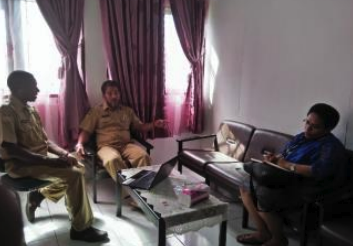Resources

Clean and Efficient Cooking Technologies and Fuels
Winrock developed technical content for the USAID Energy Toolbox Cookstove Toolkit. The toolkit can be used by various stakeholders, but is primarily aimed at bringing USG staff and external project developers and implementers up-to-speed on significant developments in the cookstove sector in recent years. The goal is to showcase, through accurate and up-to-date information and […]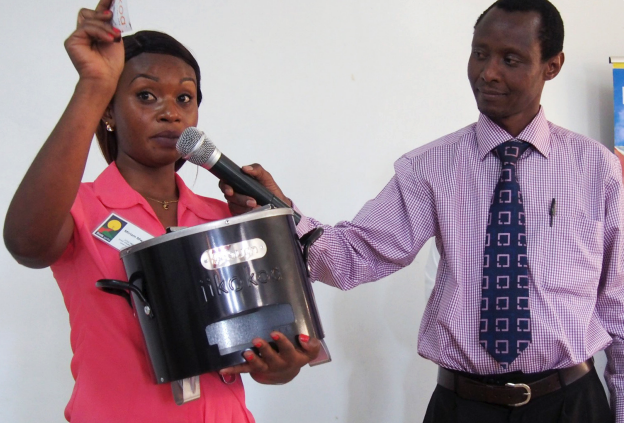
Lessons learned in cookstove financing and distribution through formal financial institution channels
In 2012 Winrock’s USAID-funded Developing a Sustainable Cookstove Sector project released a call for applications from organizations to develop innovative partnerships to address two major challenges that had been identified in a 2011 market assessment conducted by Winrock for USAID in Kenya – last mile distribution and financing for enterprises and consumers. As a result […]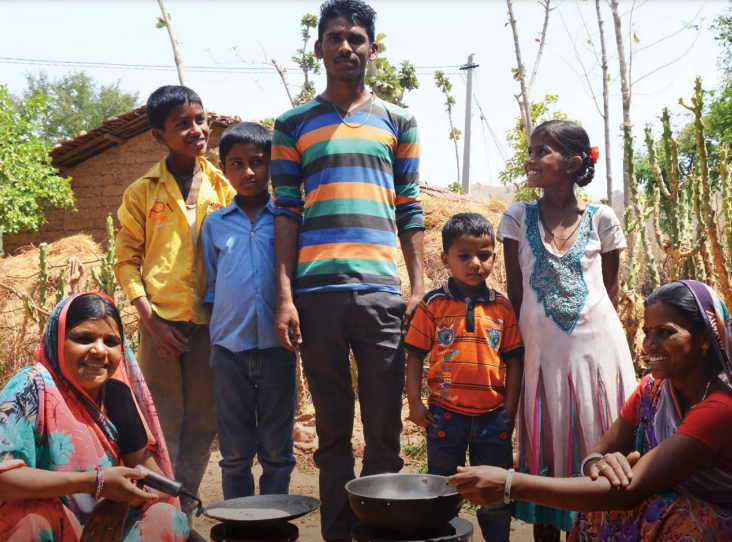
Advanced Biomass Cookstove Distribution
The cookstove sector has evolved significantly in the past few years, with a strong commitment to higher quality technologies (including efforts to develop international voluntary standards) and market-based approaches. The sector has benefited from macro-level trends that facilitate distribution. Our research identified several trends that have improved cookstove distribution. This report elaborates on the interplay […]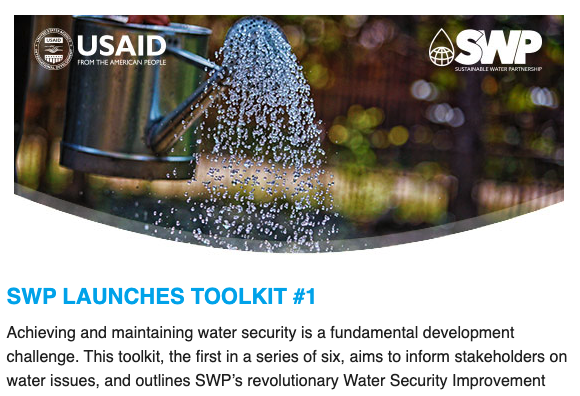
Sustainable Water Partnership Newsletter September 2017
Achieving and maintaining water security is a fundamental development challenge. This toolkit, the first in a series of six, aims to inform stakeholders on water issues, and outlines SWP’s revolutionary Water Security Improvement process. Featured in This Issue: – SWP Launches Toolkit #1 – Making a Splash in Stockholm – SWP Blog Featured on ClimateLinks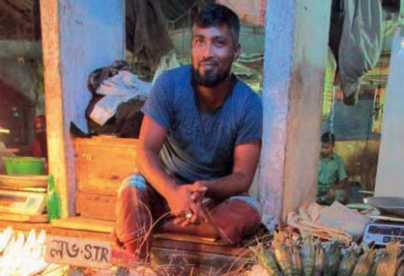
SAFETI January 2017 – September 2021
SAFETI’s vision is that by 2021, the project will have supported efforts to significantly increase farmed shrimp and prawn productivity and national exports and production; an increase in the income of all value chain participants – particularly farmers but also input suppliers and others, and an improvement in the quality of exported shrimp and prawn.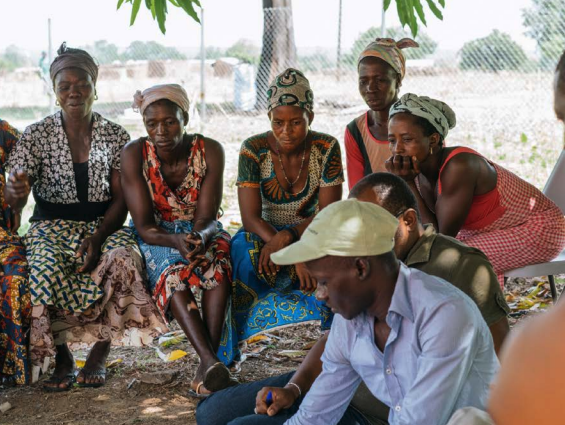
Land Tenure and Natural Resource Access Issues in Northern Ghana – With a focus on women
The USAID Feed the Future (FtF) Ghana Agriculture and Natural Resource Management Project (AgNRM) seeks to reduce poverty through sustainable increases in wealth and nutrition from natural and non-traditional agriculture products by addressing environmental, agricultural, governance, and natural resource management challenges. Using an integrated landscape approach that aligns development with conservation and responds to the […]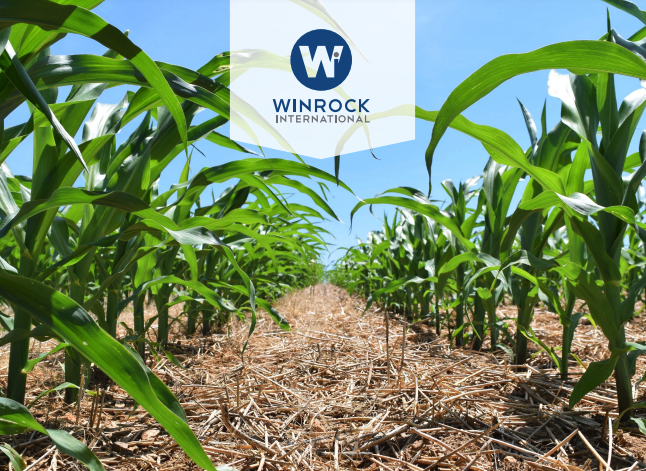
Pay-for-Performance Conservation: A How-To Guide
Authors: Kristin A. Fisher, PhD, Jonathan R. Winsten, PhD, Elisabeth Spratt (all of Winrock International), Ryan Anderson (Delta Institute), Ryan Smith (Delta Institute) Water quality impairments resulting, in part, from agricultural nutrient runoff have remained stubbornly difficult to solve in the United States. Pay-for-Performance conservation capitalizes on scientific and technological advances to identify cost-effective land […]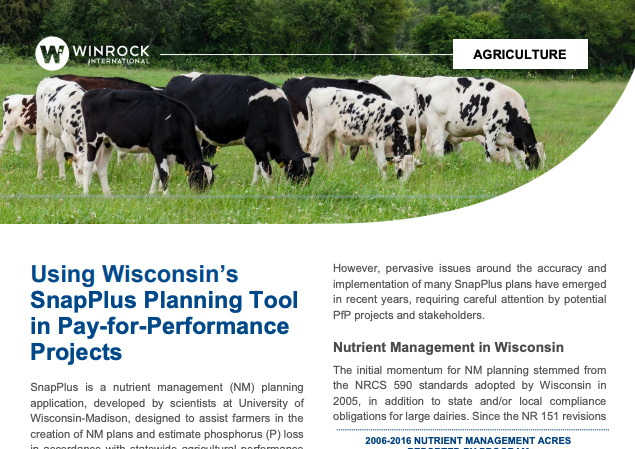
Using Wisconsin’s SnapPlus Planning Tool in Pay-for-Performance Projects
SnapPlus is a nutrient management (NM) planning application, developed by scientists at University of Wisconsin-Madison, designed to assist farmers in the creation of NM plans and estimate phosphorus (P) loss in accordance with statewide agricultural performance standards and resource management policies. SnapPlus also incorporates the latest planning criteria and guidelines from the Wisconsin Natural Resources […]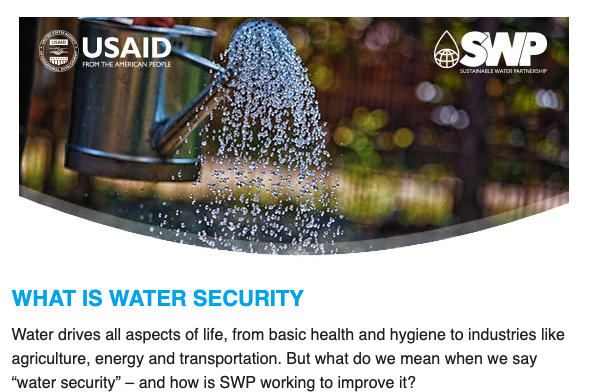
Sustainable Water Partnership Newsletter August 2017
Water drives all aspects of life, from basic health and hygiene to industries like agriculture, energy and transportation. But what do we mean when we say “water security” – and how is SWP working to improve it? Featured in this issue: – What is Water Security – Introducing the Sustainable Water Partnership – MUS Blog […]